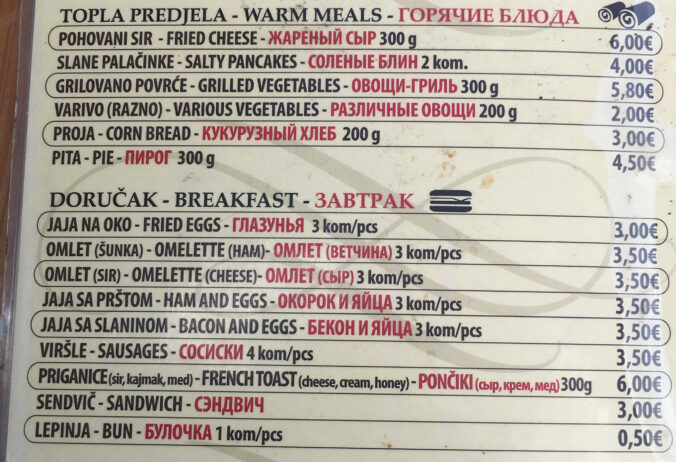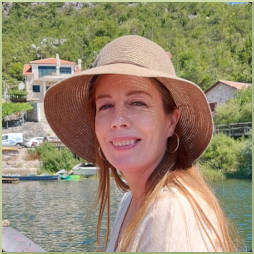When I moved to Montenegro, I didn’t know a single word of the language. I read some online guides to useful Serbian phrases (it’s the same language, just with a different name) but half of the words I never heard anyone use or I heard them in a different context and was just confused all the time.
After two years here, I have a little more of a grip on the basics and have written out some useful phrases and their context that will help you out on your trip to Montenegro or in your first phase of moving here.
I’ve focused on things that will ease your everyday interactions, as during all my travels I noticed that when you really don’t speak a language, simple politenesses, pointing, and body language will usually get you further than rote phrases and requests you won’t pronounce correctly – or even if you do, you certainly won’t understand the answer.
(For anything more complicated, there is always Google translate. Or if all else fails in a village somewhere, an English-speaking child or grandchild will often be produced to help you out.)
Dobar dan (do-barr dahn) – Good day. A formal greeting that shopkeepers and supermarket cashiers will say to you. So will your neighbours and people you run into in the elevator or in your apartment entrance. It’s polite to return it.
Dobro veče (do-broh vech-eh) – Good evening. Exactly the same usage as dobar dan, just from about 5pm onwards.
Zdravo (zdrr-ah-voh) – Hello. Same context as above but less formal. I use this most often as my standard greeting with strangers so I don’t have to remember whether it’s day or night and switch from dobar dan to dobro veće or absentmindedly get it wrong and feel stupid. (And also because I’m Australian and informal speech feels more natural to me.)
Prijatno (pree-at-noh) – Have a nice day. You will hear this and also say it at the end of a transaction, when you are leaving a shop, when your neighbour leaves the elevator (or you do). You also might hear it from the waiter when he puts down your meal, as in, enjoy!
Izvinite (iz-vin-ih-teh) – I’m sorry; excuse me. Useful as a clueless tourist or foreigner. Use it if someone is in your way, you do something wrong, or you need to get someone’s attention.
Ćao (chow) – Hi; bye. Casual greeting amongst friends or with people you either know or have seen often enough to recognise.
Izvolite (iz-vol-ih-teh) – You will hear this constantly in shops and markets but you will basically never say it. It has several different meanings and context.
- Can I help you? In a shop, the shopkeeper will say ‘Izvolite’ to you.
- Here you go. After you have ordered or requested something (food, clothing, a drink at a restaurant) and it’s being handed over, the waiter or shopkeeper will say ‘Izvolite’ to you.
- Check out what I’m selling! In a market the stall holder will shout ‘Izvolite!’ at you as you walk past to get your attention.
Još nešto (yosh nesh-toh) – Something else? You’re in a shop and you’re past the ‘Izvolite’ stage and have gestured at the meat or cheese or whatever that you want. Then you will usually hear ‘Još nešto?’ when you are asked if you want anything else.
Hvala – (fah-lah) – Thanks. Used as you would normally say thanks (or I hope you do).
Da (dah) – Yes.
Ne (neh) – No.
Imate li… (ih-mah-teh lee) – Do you have… This is a question form when you want to ask if a shop or restaurant has something. (This was the first useful phrase I learned, specifically ‘Imate li bijelo vino?’ Do you have white wine?)
Ima (ih-mah) – There is; I have. You might hear this in short form as an answer (which means whatever you asked for, they have it). You might also hear ‘Imamo’ (we have) which just means they are talking collectively about the shop or restaurant.
Nema (neh-mah) – There isn’t; I don’t have. Whatever you just asked for, they don’t have it. ‘Nemamo’ is very similar in meaning as ‘nema’, they are just saying ‘we don’t have it’.
Engleski? – English? This is the short and sweet way to ask if someone speaks English. Sure, you could use a longer and more polite phrase, but this gets the job done, your meaning across, is easier to remember and is actually way less confusing that asking a perfect long phrase in a language you don’t actually speak.
Ne razumijem (neh raz-oo-mee-yem) – I don’t understand. It’s usually pretty clear on your face if you don’t understand what someone is saying, but sometimes it is useful to say it.
Ne treba kesa (neh tre-bah keh-sah) – I don’t need a bag. When you’re tired of collecting dozens of plastic bags from the supermarket, this phrase is very useful!
Want more than just useful phrases in Montenegrin? Check out my guide on How to Learn Montenegrin.


I’m in Montenegro working virtually for the next week and your blog has been a life saver! Super helpful to know about the local supermarkets and phrases!
This is a really useful article. I really like how you have added spelling of words phonetically, this makes learning so much easier.
An excellent way to learn a few Montenegrin phrases – many thanks! It would be very useful to know where the stress is in the words. This could be marked with an accent (á) or spelling the stressed section of the word using capital letters.